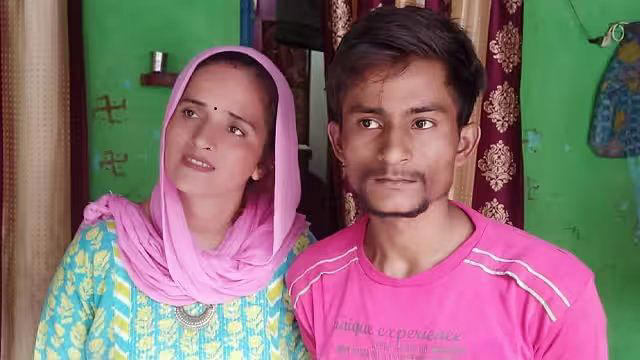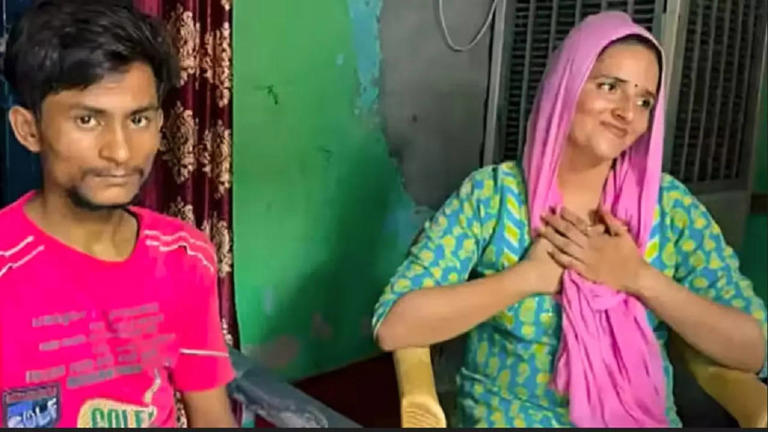Who is Seema Haider: Cross-border lover or Pakistani spy in India 2023?

Who is Seema Haider: Cross-border lover or Pakistani spy in India 2023?
Prominent Pakistani human rights activist, Shiva Kacchi, has expressed deep concern regarding the targeted violence against Hindus in the Sindh province of Pakistan. Kacchi’s apprehension follows an incident involving Seema Haider Jakhrani and urges the government to take strong punitive action against those responsible for attacking Hindu temples.
Kacchi, who leads the Pakistan Derawar Ittehad organization, an advocacy group fighting for the rights of minorities in Pakistan, has highlighted the recent attack on a temple in Ghouspur, Kashmore. This incident is seen as the alarming beginning of a series of challenges faced by the Hindu community in Sindh.

Kacchi’s statement underscores the need for urgent measures to address the growing intolerance and violence against religious minorities in the region. The activist calls upon the government to take decisive action against the perpetrators of such attacks to ensure the safety and security of the Hindu population.
The attack on the temple is a troubling manifestation of the discrimination and hostility faced by Pakistani Hindus, and Kacchi’s plea for punitive measures reflects the urgency to protect the fundamental rights of religious minorities. It serves as a reminder of the importance of promoting inclusivity, tolerance, and respect for all communities in Pakistan, regardless of their religious beliefs.
A gang of dacoits carried out a shocking attack on a Hindu temple in the Kashmore area of the Sindh province. The attackers used rocket launchers, escalating the severity of the assault. This incident occurred shortly after dacoits in the Kashmore and Ghotki riverine areas issued threats to target Hindu places of worship and community members in response to Seema’s love affair.
The attack on the temple reflects a deeply concerning escalation of violence and religious intolerance. The threat against Hindu places of worship and community members underscores the need for immediate action to ensure their safety and protect their fundamental rights.
The incident serves as a stark reminder of the ongoing challenges faced by religious minorities in Pakistan, particularly Hindus in the Sindh province. It highlights the urgent need for effective security measures and swift legal action to apprehend the perpetrators of such heinous crimes and prevent further acts of violence.
The authorities must respond promptly and firmly to such attacks, ensuring the protection of religious sites and the safety of community members. The incident underscores the importance of promoting religious harmony and fostering an environment of inclusivity and respect for all citizens, irrespective of their religious background.
Seema, a 30-year-old Pakistani woman and mother of four, made the decision to leave her country and enter India to be with a Hindu man named Sachin Meena, whom she met and fell in love with while playing the online game PUBG in 2019. Seema and Sachin currently reside in the Rabupura area of Greater Noida, near Delhi, where Sachin runs a provision store, according to the Uttar Pradesh Police.
The situation took a legal turn when Seema was arrested on July 4 for illegally entering India without a visa, having traveled through Nepal with her four children, all of whom are below the age of seven. Sachin, for his part, was also taken into custody for providing shelter to the illegal immigrants.
The arrests underscore the complex issues surrounding immigration and legal status. It is a situation where individuals make personal choices driven by love and the pursuit of a better life, but find themselves entangled in legal complications due to improper documentation and immigration procedures.
The incident highlights the importance of adhering to proper immigration protocols and legal frameworks in order to ensure safety, security, and adherence to the laws of the respective countries involved. Authorities play a crucial role in upholding and enforcing these regulations, while also considering the complexities and nuances of individual cases.
The arrests of Seema and Sachin exemplify the challenges faced by individuals involved in cross-border relationships and the legal implications that may arise from such situations. It also emphasizes the necessity for comprehensive immigration policies that address the concerns of both national security and humanitarian considerations.
Shiva Kacchi, the prominent Pakistani human rights activist, expressed deep concern over the escalating threats made by dacoits in the riverine areas. In live videos, these criminals have been issuing warnings of violence against Hindus, including killing and kidnapping, as well as targeting their places of worship, homes, and women. Kacchi strongly condemned these threats, highlighting that the actions of Seema Jakhrani, a Muslim woman who made a personal decision, should not be a reason to target the Hindu community in Sindh.
Kacchi emphasized that Hindus should not be held accountable for the choices made by individuals from different religious backgrounds. He questioned why the Hindu community is being subjected to such reprisals, pointing out that the decision made by Seema Jakhrani was a personal one and unrelated to the Hindu community.
Furthermore, Kacchi highlighted the persistent issue of Hindu girls being abducted, forcibly converted to Islam, and married to older Muslim men in Sindh. He stressed that the government and authorities have been alerted to these rising cases for several months, underscoring the need for urgent attention and action to address this distressing pattern.
Kacchi’s statements shed light on the urgent need for protection of religious minorities, particularly the Hindu community in Sindh, and the significance of addressing the systemic challenges they face. The remarks serve as a plea to the government and authorities to take decisive measures to ensure the safety, security, and rights of all individuals, regardless of their religious affiliation, in order to foster a society that upholds religious freedom and respects the dignity of every individual.
Shiva Kacchi expressed the belief that Seema Jakhrani’s actions have caused distress among Pakistani Muslims and acknowledged that many people consider her actions to be wrong. However, he raised a pertinent question regarding the safety and well-being of women and girls belonging to the Hindu community. Kacchi emphasized that while addressing Seema Jakhrani’s case is important, it is equally crucial to address the ongoing challenges faced by Hindu women and girls in Pakistan.
Kacchi provided an update on the attack on the temple in Ghouspur, stating that fortunately, there were no casualties as the two rockets fired by the dacoits failed to explode properly. However, he highlighted that the attackers resorted to heavy firing before fleeing into the riverine area, indicating the seriousness and potential danger of the situation.
These incidents underscore the urgent need for comprehensive measures to ensure the safety, security, and protection of religious minorities, particularly the Hindu community. Kacchi’s statements serve as a call to action, urging authorities to address not only the immediate threats and attacks but also the underlying issues that perpetuate violence and discrimination against religious minorities.
The situation calls for a concerted effort to promote religious tolerance, protect the rights of all individuals, and create an environment where everyone can coexist peacefully, regardless of their religious background. It is crucial for the government and relevant authorities to take immediate steps to investigate such attacks, apprehend the perpetrators, and implement measures to prevent future incidents of violence and discrimination.
Shiva Kacchi expressed concern over the distress caused among Pakistani Muslims by Seema Jakhrani’s actions, recognizing that many people view her actions as wrong. However, he emphasized the need to address the ongoing challenges faced by Hindu women and girls in Pakistan, emphasizing the importance of their safety and well-being.
Regarding the attack on the temple in Ghouspur, Kacchi provided an update, stating that fortunately, there were no casualties as the two rockets fired by the dacoits failed to explode properly. He highlighted the seriousness of the situation, as the attackers resorted to heavy firing before escaping into the riverine area.
These incidents underscore the immediate need for comprehensive measures to ensure the safety and protection of religious minorities, particularly the Hindu community. Kacchi’s statements serve as a call to action, urging authorities to address not only the immediate threats and attacks but also the underlying issues that contribute to violence and discrimination against religious minorities.
There is a pressing need to promote religious tolerance, safeguard the rights of all individuals, and foster an environment of peaceful coexistence, irrespective of religious backgrounds. It is essential for the government and relevant authorities to take immediate action by investigating these attacks, apprehending the perpetrators, and implementing preventive measures to avert future instances of violence and discrimination.
The report emphasized the importance of swift investigation by the Sindh Home Department into the matter. Karachi, a city in Sindh province, houses numerous ancient Hindu temples, reflecting the historical presence of the Hindu community in Pakistan. Hindus constitute the largest minority community in the country.
The majority of Pakistan’s Hindu population resides in Sindh province, where they share cultural practices, traditions, and language with their Muslim counterparts. This highlights the deep-rooted connection and commonalities between the Hindu and Muslim communities in the region.
Seema Haider, a Pakistani citizen who illegally entered India in May, has been questioned by the Uttar Pradesh Police’s Anti-Terrorist Squad (ATS) for a second consecutive day. Sachin Meena, her Indian partner with whom she is currently residing in Greater Noida, has also been taken in for questioning by the agency. The cross-border couple had previously been interrogated by the UP ATS on Monday at their office in Noida and were released late in the night.
Seema Haider, aged 30, and Sachin Meena, aged 22, were initially arrested by the local police in Greater Noida on July 4. However, they were subsequently granted bail by a court on July 7. The ongoing questioning by the ATS suggests that further investigation is being conducted regarding their case.






